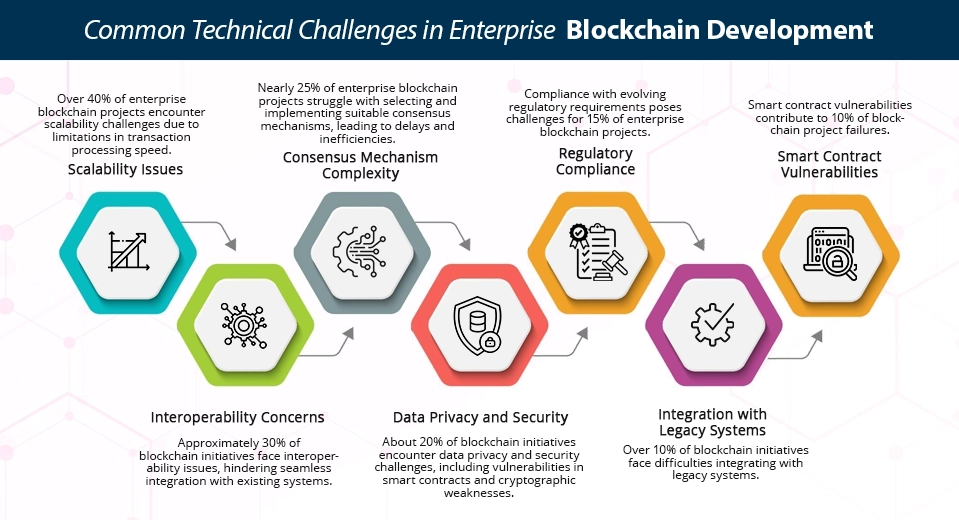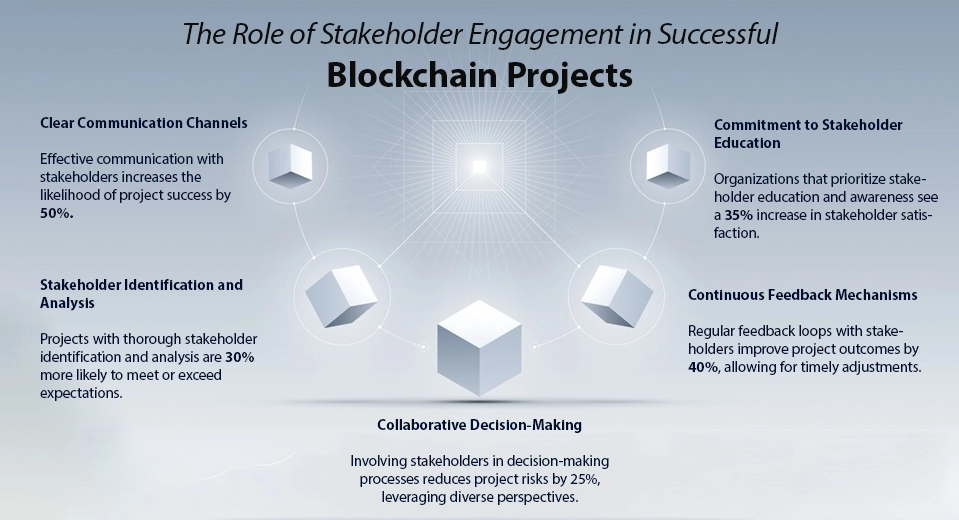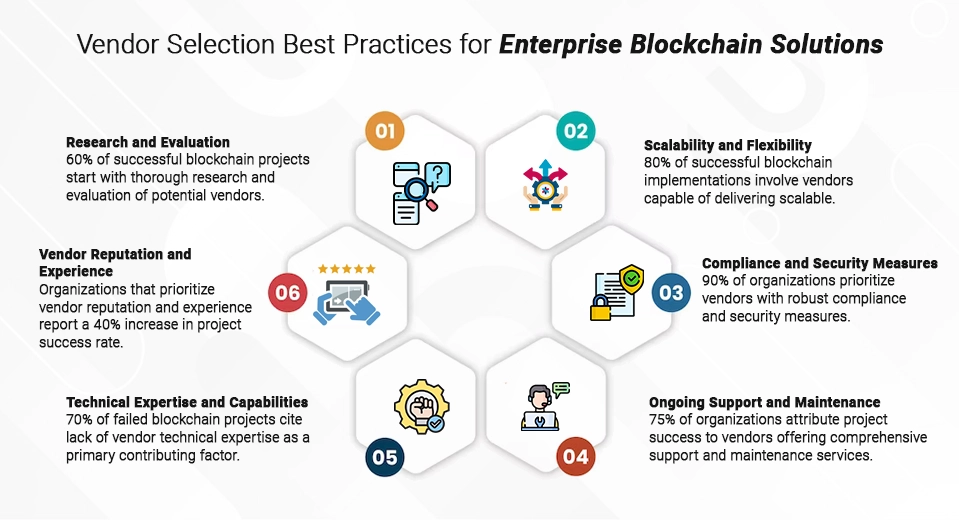Table of Contents
Blockchain emerges as a beacon of promise, offering transformative solutions to age-old challenges. However, within blockchain’s potential lies a landscape fraught with pitfalls and intricacies. Organizations increasingly embrace blockchain technology to revolutionize their operations. It becomes imperative to navigate the path with caution and foresight. The journey toward successful enterprise blockchain development is shaped by lessons learned from past missteps. According to a report by Gartner, a staggering 90% of enterprise blockchain projects launched in 2021 suffered from a lack of clear use case identification. This statistic underscores the critical importance of laying a strong foundation for blockchain initiatives.
Additionally, a survey found that 60% of failed blockchain initiatives can be attributed to poor planning and execution. This highlights the necessity for organizations to invest ample time and resources into meticulous planning and strategic execution. In this comprehensive guide, we delve into nine common mistakes that best custom software development companies must circumvent in enterprise blockchain development projects. From overlooking scalability and performance concerns to neglecting security and compliance considerations, each misstep represents a potential hindrance on the journey to blockchain success.
By shedding light on these pitfalls and offering insights backed by empirical evidence. We aim to empower organizations to embark on their blockchain journey fortified with knowledge, foresight, and a steadfast commitment to innovation. Join us as we navigate the intricate landscape of enterprise blockchain development, unveiling the complexities, and charting a course towards triumphant implementation. Let us embark on this odyssey together, armed with empirical evidence, prescient insight, and an unwavering dedication to pioneering change.
Understanding Enterprise Blockchain Development: What You Need to Know
In the rapidly evolving landscape of enterprise technology, blockchain emerges as a transformative force, offering unparalleled opportunities for innovation and efficiency. According to a report by IDC, global spending on blockchain solutions is projected to reach $15.9 billion by 2023, reflecting the growing recognition of blockchain’s potential across industries. Understanding enterprise blockchain development is crucial for organizations looking to harness the power of this disruptive technology to revolutionize their operations and drive sustainable growth.
Blockchain technology, renowned for its decentralized and immutable nature, holds the promise of enhanced transparency, security, and efficiency in enterprise settings. Research reveals that 53% of organizations view blockchain as a critical priority for their operations, highlighting the widespread recognition of its value. By leveraging cryptographic principles and distributed ledger technology, enterprise blockchain solutions enable software development security and tamper-proof record-keeping, streamlined transaction processes, and improved trust among stakeholders.
Moreover, the benefits of enterprise blockchain development extend beyond traditional sectors. With emerging applications in supply chain management, healthcare, finance, and beyond. For instance, companies like Maersk and IBM have successfully implemented blockchain-based supply chain solutions to track the provenance of goods and streamline logistics operations. Similarly, financial institutions are exploring blockchain for faster and more secure cross-border payments, with the potential to reduce settlement times from days to minutes.
Understanding the intricacies of enterprise blockchain development is essential for organizations seeking to remain competitive in the digital age. By embracing blockchain technology and its transformative potential, blockchain development company in USA can unlock new opportunities for innovation, collaboration, and value creation across diverse industries. As the adoption of blockchain continues to accelerate, organizations must stay informed and proactive in harnessing its benefits to drive sustainable growth and success in the years to come.

Why do Enterprise Blockchain Development Projects Fail?
The promise of transformative solutions often meets the harsh reality of failure. Despite the immense potential of blockchain technology, a significant number of enterprise blockchain development projects end in disappointment and setbacks. Understanding the reasons behind the failure of these initiatives is crucial for organizations seeking to navigate the complexities of blockchain implementation successfully. Let’s explore some key factors contributing to the failure of enterprise blockchain development projects:
1. Lack of Clear Use Case Identification
One of the primary reasons for the failure of enterprise blockchain projects is the failure to identify clear and practical use cases for blockchain technology. Without a clear understanding of how blockchain can address specific business challenges, projects often lack direction and fail to deliver tangible results.
2. Inadequate Planning and Strategy
Poor planning and strategy are common culprits behind failed blockchain initiatives. According to industry estimates, over 50% of failed blockchain projects can be attributed to inadequate planning and strategy. Insufficient attention to project scope, resource allocation, and timeline management can lead to project delays, budget overruns, and ultimately, project failure.
3. Technical Complexity and Implementation Challenges
Blockchain technology is inherently complex, requiring specialized technical expertise for successful implementation. Many blockchain software development company projects fail due to technical challenges such as scalability limitations, interoperability issues, and integration complexities with existing systems. These technical hurdles often exceed the capabilities of development teams, resulting in project setbacks and eventual failure.
4. Resistance to Change and Organizational Culture
Resistance to change and entrenched organizational culture can pose significant barriers to the success of enterprise blockchain projects. Despite the potential benefits of blockchain technology, organizational inertia and reluctance to adopt new paradigms can hinder progress and impede project success.
Discover the limitless possibilities of blockchain for your enterprise. Connect with us and start your blockchain journey now
Enterprise Blockchain Features You Must Know
The enterprise ecosystem’s many use cases for blockchain are attracted to its many capabilities, which close gaps and cover gaps. Here are some of the most important blockchain elements custom software development services should be aware of.
1. Decentralization
It’s often accepted in a business setting that everything should go through a centralized channel, including communication and compliance. Through the integration of a decentralized mechanism, the Blockchain of Things, into commercial communication networks and compliance, your organization can establish a system that is impervious to tampering. This strategy also makes it possible for the business to run on an impenetrable system.
2. Immutability
Quality and accuracy are crucial because of the immutability method used by blockchain. That however makes it difficult to alter content once it has been included in a block. A traditional system reduces quality to a back-and-forth. Which not only prolongs delivery times but also produces results that aren’t always up to par or even in line with the original specifications. However, the likelihood of information accuracy and quality control naturally rises when the best custom software development companies are under the strain of having their data locked in the system.
3. Transparency
Because blockchain makes everything transparent, it creates a whole new level of responsibility for stakeholders and employees in the company. Blockchain’s transparency features are revolutionizing how transactions will be made in the future.
The intrinsic transparency of blockchain technology revolutionizes the conventional business environment by making all transactions irreversible and traceable. Accountability is promoted by this transparency for both stakeholders and employees. A greater sense of accountability is fostered by the knowledge that one’s acts are permanently documented. Subsequently, this reduces the likelihood of dishonest or unethical behavior.
4. Smart Contracts
Smart contracts are self-executing agreements with predetermined terms and circumstances. These automated contracts based on blockchain offer some significant advantages. By streamlining processes and doing away with the need for middlemen, they increase efficiency and reduce operational expenses.
Smart contracts increase transaction speed and accuracy while decreasing the likelihood of errors and disputes by automating operations. By expediting the whole contract lifecycle, their implementation promotes a seamless and transparent contractual environment. Smart contracts provide a decentralized, secure, and efficient way to execute online agreements. Making them a revolutionary breakthrough in contract management.
Requirements of a Good Blockchain Enterprise Solution
Blockchain, when looked at in the public system versus when operating in an enterprise ecosystem, shows a completely different picture. The differences are not just in the face of the blockchain enterprise use cases. But also in terms of the specifics that are demanded in terms of features or requirements.
For an enterprise blockchain solution, the expected requirements from the technology revolve around
1. Privacy
The data in a public blockchain is open for public viewing. But when blockchain is used in an organizational setting, data and information. That can be used by users who follow business-related regulations and compliances. Blockchain software development company permission viewing must be the foundation of the technique used for blockchain use cases to materialize. When used in a commercial setting, the technology should only grant access to those who are allowed, not to every employee.
2. Security
While privacy and security are closely related, enterprise blockchain security functionality differs greatly from public blockchain system security. In a public blockchain system, features like Know Your Customer and Anti Money Laundering are optional, but they become crucial when an organization’s security configuration is breached. Even while blockchain technology promises increased security and a system that is impenetrable to hackers. Adding additional security layers to your blockchain is practically a need when setting up a blockchain development company in the USA.
3. Throughput Time
On blockchain systems, there are notable differences in transaction volumes between permission and public configurations. Public blockchains can average more transactions per second due to their higher scalability. Furthermore, a consensus protocol’s scalability is improved by a larger number of participating nodes, albeit this may also shorten throughput times. However, since corporate blockchain operates in the exact opposite way, blockchain app hire software developers must maintain the lowest possible throughput time.
4. Operational Cost
Reducing operating expenses is unquestionably one of the most crucial things for a business, regardless of the magnitude of its sales. Companies would rather operate with minimal and predictable operating costs. Thus, it becomes crucial to keep in mind that the blockchain corporate application needs to operate on an affordable platform with consistent, foreseeable transaction fees.
The demand that the blockchain industry has responded to by providing private and permissioned blockchain platforms. That is designed around these enterprise expectations and criteria have increased as a result of the requirement set that we just covered.
9 Common Mistakes to Avoid Enterprise Blockchain Development Projects
Blockchain has emerged as a transformative force, promising enhanced transparency, security, and efficiency in business operations. However, despite its immense potential, enterprise blockchain development projects often encounter challenges that hinder their success. From inadequate planning to overlooking critical considerations, organizations navigating the complexities of blockchain implementation must be vigilant to avoid common pitfalls.
According to a report by Gartner, only 10% of enterprise blockchain projects launched in 2019 succeeded in delivering value due to a lack of clear use case identification and strategic planning. Moreover, A survey revealed that 60% of failed blockchain initiatives can be attributed to poor planning and execution. These statistics underscore the importance of understanding the nuances of blockchain technology. Adopting best practices to mitigate risks and maximize the potential of blockchain solutions.
From the identification of clear use cases to the integration of blockchain solutions with existing systems, our guide equips organizations. With the knowledge and strategies needed to unlock the transformative power of blockchain technology.
1. Lack of Clear Use Case Identification
Failing to identify clear and practical use cases is a common pitfall in enterprise blockchain projects. Without a defined use case, projects may lack direction and fail to deliver tangible benefits. According to a report by Gartner, 90% of enterprise blockchain projects launched in 2019 suffered from a lack of clear use case identification. Organizations must conduct thorough analyses of their business processes and identify areas where blockchain technology can add value. Such as supply chain management, identity verification, and financial transactions.
2. Poor Planning and Strategy
Inadequate planning and strategy before initiating blockchain projects can lead to failure. Without a well-defined roadmap and clear objectives, projects may encounter delays, cost overruns, and scope creep. Digital transformation companies in the USA need to invest time and resources in comprehensive project planning, including defining project scope, setting realistic timelines, and allocating appropriate resources.
3. Insufficient Understanding of Blockchain Technology
Proceeding with development without a thorough understanding of blockchain fundamentals is a common mistake that hinders software development security. Blockchain technology is complex and requires a deep understanding of cryptographic principles, consensus mechanisms, and smart contract development. A report by Forrester reveals that 42% of companies experience delays in blockchain projects due to a lack of technical expertise. Organizations should invest in training and education for their development teams. To ensure they have the necessary skills to navigate the complexities of blockchain technology effectively.
4. Inadequate Stakeholder Engagement
Failing to involve key stakeholders throughout the development process can lead to misalignment of expectations and project failure. Active collaboration with stakeholders, including business leaders, end-users, and regulatory bodies, is essential for ensuring that blockchain solutions meet the needs of all stakeholders. According to PwC, 77% of successful blockchain projects involve active collaboration with stakeholders. Organizations should prioritize communication and transparency throughout the development lifecycle to ensure that stakeholders are engaged and informed.
5. Ignoring Scalability and Performance
Overlooking the scalability and performance requirements of blockchain solutions can hinder adoption and scalability. Blockchain networks must be capable of handling increasing transaction volumes and maintaining performance under high loads. IBM reports that 80% of enterprises believe scalability is the most significant challenge for blockchain adoption. Organizations should carefully consider scalability and performance requirements during the design and implementation phases of blockchain security services and explore solutions such as sharding, sidechains, and off-chain scaling to address scalability challenges.
6. Neglecting Security and Compliance
Ignoring security and compliance considerations in blockchain development can expose organizations to risks such as data breaches and regulatory penalties. According to Verizon, 39% of blockchain-related data breaches occurred due to vulnerabilities in smart contracts and other blockchain components. Custom software development services providers should prioritize security by implementing robust authentication mechanisms, encrypting sensitive data, and conducting regular security audits. Additionally, compliance with regulatory requirements such as GDPR, HIPAA, and PCI DSS is essential for maintaining trust and avoiding legal repercussions.
7. Poor Integration with Existing Systems
Failing to integrate blockchain solutions seamlessly with existing IT infrastructure can lead to interoperability issues and operational inefficiencies. Organizations should consider factors such as data compatibility, API integration, and legacy system support when designing blockchain solutions. Collaborating with experienced integration specialists can help organizations overcome integration challenges. To ensure that blockchain solutions complement existing systems and processes.
8. Overestimating Blockchain as a Panacea
Viewing blockchain as a cure-all solution without considering its limitations is a common mistake. While blockchain technology offers significant potential for improving transparency, security, and efficiency, it is not a one-size-fits-all solution. IDC forecasts that by 2023, 90% of blockchain projects will suffer “blockchain fatigue” due to a lack of understanding of its potential and limitations. Organizations should conduct thorough cost-benefit analyses and assess whether blockchain is the most appropriate solution for addressing their specific business needs.
9. Lack of Continuous Improvement
Failing to iterate and improve blockchain solutions based on feedback and evolving requirements can result in stagnation and missed opportunities for innovation. According to McKinsey, 70% of executives believe their blockchain initiatives will fail if they don’t overhaul their operating models. Organizations should adopt agile development methodologies and embrace a culture of continuous improvement. To adapt to changing market dynamics and emerging technologies, regularly soliciting user feedback, and monitoring performance metrics. Incorporating lessons learned into future iterations is essential for driving ongoing success and innovation in blockchain projects.

Enterprise Blockchain Development: Use Cases for Blockchain
Innovators and visionaries across different industries to understand the advantages of blockchain technology. The blockchain for enterprise use cases is making its way into almost every industry vertical today. Below, we have shared a few real-world enterprise blockchain use cases by industry.
1. Banking and Finance
The symbiotic relationship between blockchain and the finance industry has deep historical roots, marking a revolutionary impact on FinTech. This evolution unfolds through meticulous pilot programs, comprehensive tests, and Proof of Concepts (POCs). Prominent financial giants, including RBC, Santander, JP Morgan, BNY Mellon, Citibank, Visa, American Express, Goldman Sachs, and MasterCard, are at the forefront of this journey.
These industry leaders are not merely engaged in blockchain initiatives; they have also established internal working groups dedicated solely to exploring and implementing enterprise blockchain technology. The expansive landscape of blockchain use cases in finance extends well beyond these pioneering efforts, encompassing a broad spectrum of applications.
Consider the example of a banking institution that has made big moves in adopting blockchain technology. It has been actively involved in blockchain initiatives. The company uses enterprise-focused Ethereum-based blockchain technology, Quorum. Which aims to power the Interbank Information Network (IIN). To shorten processing times to improve the effectiveness of cross-border payments.
2. Insurance
Blockchain is key to transforming the insurance sector because it improves security, efficiency, and transparency across various activities. One prominent application of blockchain technology in real life is insurance claims processing. The insurance claims procedure typically involves several middlemen, which causes delays and raises the risk of fraud. Smart contracts can be utilized with blockchain technology to automate and expedite the claims settlement.
The risk of false claims is decreased at every stage- from submitting a claim to verification. Payment is tracked on a decentralized, tamper-resistant ledger. This improves stakeholder trust while also accelerating the settlement process for digital transformation in healthcare. The application of blockchain technology in the insurance sector is a prime example of how the technology improves industry efficiency while lowering operational complexity.
3. Education
The use of blockchain in education ensures the integrity of educational records by offering a transparent and decentralized system for storing and authenticating academic credentials. It lowers the possibility of fraud by facilitating the safe and impenetrable issue of degrees and certificates. Employers and other digital transformation companies in the USA can expedite credential validation by leveraging smart contracts to support automated verification processes.
Furthermore, blockchain can empower students by granting them more control over their academic records and facilitating convenient, portable access to their credentials. This technology fosters trust in the education system, as information is immutable and resistant to manipulation.
The Massachusetts Institute of Technology (MIT) is one of the prime examples of blockchain in education use cases. This initiative gives graduates direct control over sharing their credentials. Eliminating the risk of fraud and streamlining the verification procedures for both businesses and educational institutions.
4. Automobiles
Auto manufacturers have realized that the complete essence of the mobility industry is altering. Everything from autonomous vehicles to ride-sharing is changing the traditional mobility world. In the face of all these changes, several automotive companies are planning to enter the blockchain world to participate in mobility reinvention programs. By harnessing the potential of blockchain, these companies aim to streamline operations. But also revolutionize the way people interact with transportation services. This strategic shift reflects a commitment to staying at the forefront of mobility innovation. Meeting the evolving needs of consumers in an ever-changing world.
5. Aviation
Blockchain technology in aviation helps airlines maintain record security and manage aviation maintenance. Streamline tokenized ticketing and deliver a seamless digital travel experience. Record keeping in aviation is one of the key areas of utilization of blockchain technology. Airlines can minimize the possibility of discrepancy or manipulation by securing flight data, maintenance records, and other critical information on a blockchain. This ensures the integrity and security of these records.
In 2017, a reputed company conducted a Proof of Concept with blockchain technology at Berkeley to track jet plane parts. Tokenized ticketing is yet another intriguing use of blockchain technology in aviation. Airlines can create digital assets representing a passenger’s right to a seat on a certain aircraft by tokenizing tickets on a blockchain. Blockchain security services create new opportunities for loyalty programs and other customer incentives in addition to streamlining the ticketing process.
Blockchain technology is revolutionizing the airline sector by augmenting security, optimizing efficacy, and opening up new digital travel experiences for passengers. There will likely be more innovative blockchain uses in aviation in the future as the technology develops.
6. Retail
When it comes to blockchain, the retail industry is one of the most concentrated on the technology industries that are making retail more profitable. Ultimately, the industry gives a high scope to the technology to work around supply chain management. Blockchain for enterprise offers an unchangeable and transparent ledger that traces the path of goods from manufacturing to delivery, which has the potential to transform supply chain management in the retail industry completely.
Retailers can verify suppliers’ ethical and sustainable practices, track the origin of items, and ensure product authenticity by implementing blockchain technology in supply chain management. Not only does this transparency contribute to the preservation of product quality, but it also fosters consumer trust.
A prominent company uses an in-house-based private blockchain network to track the product’s authenticity in the supply chain and reduce the number of counterfeit goods entering the system. The company also uses blockchain to simplify cross-border transactions and provide customers with accurate product data.
7. Supply Chain and Logistics
Blockchain-based applications in supply chain and logistics can greatly improve management by enabling faster and more cost-efficient delivery of products, traceability, coordination between partners, and access to financing. Blockchain uses DLT (distributed ledger technology), which benefits the supply chain and logistics industry. By recording the motions of each shipping container in real-time, eliminating unnecessary steps in delivery. Also, by reducing bottlenecks and human errors with smart contracts.
The application of blockchain technology has the potential to completely transform the logistics industry by offering a decentralized, safe platform for tracking goods. This system provides a strong framework for minimizing errors and maximizing overall logistics efficiency, going beyond simple tracking.
8. Real Estate
Blockchain is increasingly becoming a preferred method for investors, sellers, and buyers in the real estate sector to connect and explore property opportunities. The distributed ledger technology in blockchain-based real estate applications increases trust. With greater transparency and expediting contract processes while saving time and money.
A well-known real estate investment firm has explored blockchain technology to streamline real estate transactions. Utilizing blockchain technology simplifies the complex procedures involved in purchasing and selling real estate assets by utilizing blockchain.
Blockchain technology facilitates the development of a safe, transparent ownership record. Enterprise software development companies make transactions easier to handle while enhancing security and trust, opening up the possibilities for more reliable and successful real estate transactions.
9. Healthcare
Blockchain in healthcare has shown promising results for the last few years. Implementing a blockchain-based solution helps identify challenges and improves the overall performance, security, and transparency in sharing medical data in the industry.
Blockchain in healthcare has many uses, such as supply chain transparency, maintaining and accessing patients’ EHRs, smart contracts for insurance and supply chain, medical staff credential verification, and IoT blockchain use cases for monitoring remote devices.
One of the biggest names in pharmaceuticals has been actively exploring blockchain technology to protect the integrity of its supply chain. They aim to improve pharmaceutical product traceability and transparency by utilizing blockchain technology as it moves through the complex supply chain. The pharmaceutical sector is about to undergo a revolution owing to the strategic deployment of blockchain technology. Which offers a safe and unchangeable record of each product’s journey.
10. Media & Entertainment
Blockchain use cases in the media and entertainment industry are continuously evolving. Currently, the media industry uses blockchain to disseminate royalty payments for movies, music, and streaming services. The Blockchain use cases in media and entertainment are also facilitating new business models. That allows the industry to meet the changing demands of consumers and deliver them to encourage usage-based payments.
A significant participant in the media sector has actively engaged in and embraced blockchain-based initiatives. The company is investigating how blockchain technology might be used in several important media-related industries. This covers digital rights management, content distribution, and general media supply chain optimization.
Transformed how media material is delivered, safeguarded, and managed by introducing increased efficiency, transparency, and security in these crucial areas by utilizing the inherent benefits of blockchain technology.
So, these were some of the best blockchain use cases in enterprises that are prevalent today. Now, let us delve into the other side of the coin – the challenges surrounding blockchain’s widespread adoption and the innovative solutions poised to overcome them.

Selecting The Right Enterprise Blockchain Solution: Considerations and Best Practices
Choosing the appropriate enterprise blockchain solution is a pivotal decision for organizations seeking to leverage distributed ledger technology (DLT) effectively. As blockchain continues to gain traction across various industries, selecting the right solution requires careful consideration and adherence to best practices. This guide explores the key considerations and best practices involved in selecting an enterprise blockchain solution that aligns with artificial intelligence in software development and organizational objectives and fosters successful implementation.
1. Define Clear Objectives and Use Cases
Identify specific business objectives and use cases that the blockchain solution is intended to address. Clarifying these goals will guide the selection process and ensure alignment with organizational priorities.
2. Evaluate Scalability and Performance
Assess the scalability and performance capabilities of potential blockchain solutions. Consider factors such as transaction throughput, latency, and network capacity. To determine the solution’s ability to accommodate future growth and handle increasing transaction volumes.
3. Consider Interoperability and Integration
Evaluate the interoperability of the blockchain solution with existing systems and external networks. Seamless integration with legacy infrastructure and compatibility with industry standards are essential for minimizing disruption and maximizing efficiency.
4. Assess Security and Privacy Features
Prioritize security and privacy considerations when evaluating blockchain solutions. Look for features such as robust encryption, access controls, and data privacy mechanisms to safeguard sensitive information and ensure regulatory compliance.
5. Review Governance and Consensus Mechanisms
Examine the governance model and consensus mechanism employed by the blockchain solution. Ensure that the governance structure aligns with the organization’s decision-making processes and that the consensus mechanism supports the desired level of decentralization and trust.
6. Evaluate Vendor Reputation and Support
Research the reputation and track record of blockchain solution providers. Consider factors such as vendor experience, customer testimonials, and ongoing support and maintenance services to assess the reliability and credibility of potential vendors.
7. Assess Cost and Total Ownership
Evaluate the total cost of ownership associated with implementing and maintaining the blockchain solution. Consider factors such as licensing fees, implementation costs, ongoing maintenance expenses, and potential ROI to make informed financial decisions.
8. Engage Stakeholders and Obtain Buy-In
Involve key stakeholders from across the organization in the selection process. Solicit input from departments such as IT, legal, finance, and operations to ensure that the chosen blockchain solution meets the diverse needs and requirements of all stakeholders.
9. Pilot and Test Before Full Deployment
Consider piloting the selected blockchain solution in a controlled environment before full deployment. Conduct thorough testing and validation to identify any potential issues or limitations and refine the implementation strategy accordingly.
By following these considerations and best practices, enterprise software development companies can effectively navigate the complexities of selecting the right enterprise blockchain solution and lay the groundwork for successful implementation and integration into their business processes.
Conclusion: Key Takeaways for Successful Enterprise Blockchain Development
In conclusion, the journey towards successful enterprise blockchain development demands meticulous planning, robust stakeholder collaboration, and a proactive approach to risk management. Furthermore, scalability and security remain paramount considerations, with IBM reporting that 80% of enterprises believe scalability to be the most significant challenge for blockchain and agile methodology in software development. Seamless integration with existing systems is also imperative, as indicated by a study by IDC, which predicts that by 2023, 90% of blockchain projects will necessitate replacement due to integration issues.
Moreover, fostering a culture of continuous improvement and innovation is essential for long-term success in blockchain endeavors. By embracing these principles and leveraging the transformative potential of blockchain technology, custom software development companies in USA can navigate the intricacies of implementation and unlock unprecedented levels of efficiency and transparency across their operations.
Don’t miss out on the blockchain revolution! Contact us now to explore enterprise blockchain development opportunities.
Frequently Asked Questions (FAQs) About Enterprise Blockchain Development
1. What is Enterprise Blockchain Development, and Why is it Important?
The development and application of blockchain-based solutions for process optimization, security, and transparency in major enterprises is known as enterprise blockchain development. It is significant because it enables businesses to use decentralized technology to transform their processes. Cut expenses, and lower the dangers involved with centralized systems that are more traditional.
2. How does Blockchain Technology Benefit Enterprise Development Projects?
Enterprise development projects can benefit from blockchain technology in several ways, including better traceability of transactions, increased security through cryptography, and reduced operational costs. By doing away with middlemen, and increasing efficiency through the automation of processes through smart contracts.
3. What are Some Common Challenges Faced in Enterprise Blockchain Development?
Enterprise blockchain development frequently faces several difficulties, such as scalability problems. The network’s expanding size, interoperability issues between various blockchain platforms, worries about regulatory compliance, difficulties implementing consensus mechanisms, and the requirement to protect data privacy and confidentiality.
4. How can Organizations Ensure The Success of Their Enterprise Blockchain Development Initiatives?
Enterprise blockchain development initiatives can be successful if organizations do the following: they invest in strong infrastructure and technical know-how and prioritize security and compliance measures. Embrace a culture of continuous learning and adaptation, and conduct in-depth research and analysis to identify appropriate use cases.
5. What are Some Real-world Examples of Successful Enterprise Blockchain Implementations?
Supply chain management systems are used by businesses like IBM and Walmart to track the provenance of goods. Financial services platforms using blockchain for cross-border payments and settlements, and healthcare systems. Using blockchain for safe patient data management is a few noteworthy examples of successful enterprise blockchain implementations.
6. What Role Does Interoperability Play in Enterprise Blockchain Development?
Because it makes it possible for various blockchain networks to connect and communicate with one another without difficulty, interoperability is essential to enterprise blockchain growth. This improves scalability and encourages cooperation amongst many ecosystem stakeholders. To make it easier to transfer assets and data between different platforms, especially in artificial intelligence in software development. Therefore, interoperability standards and protocols are crucial for promoting blockchain technology’s broad industry adoption.






